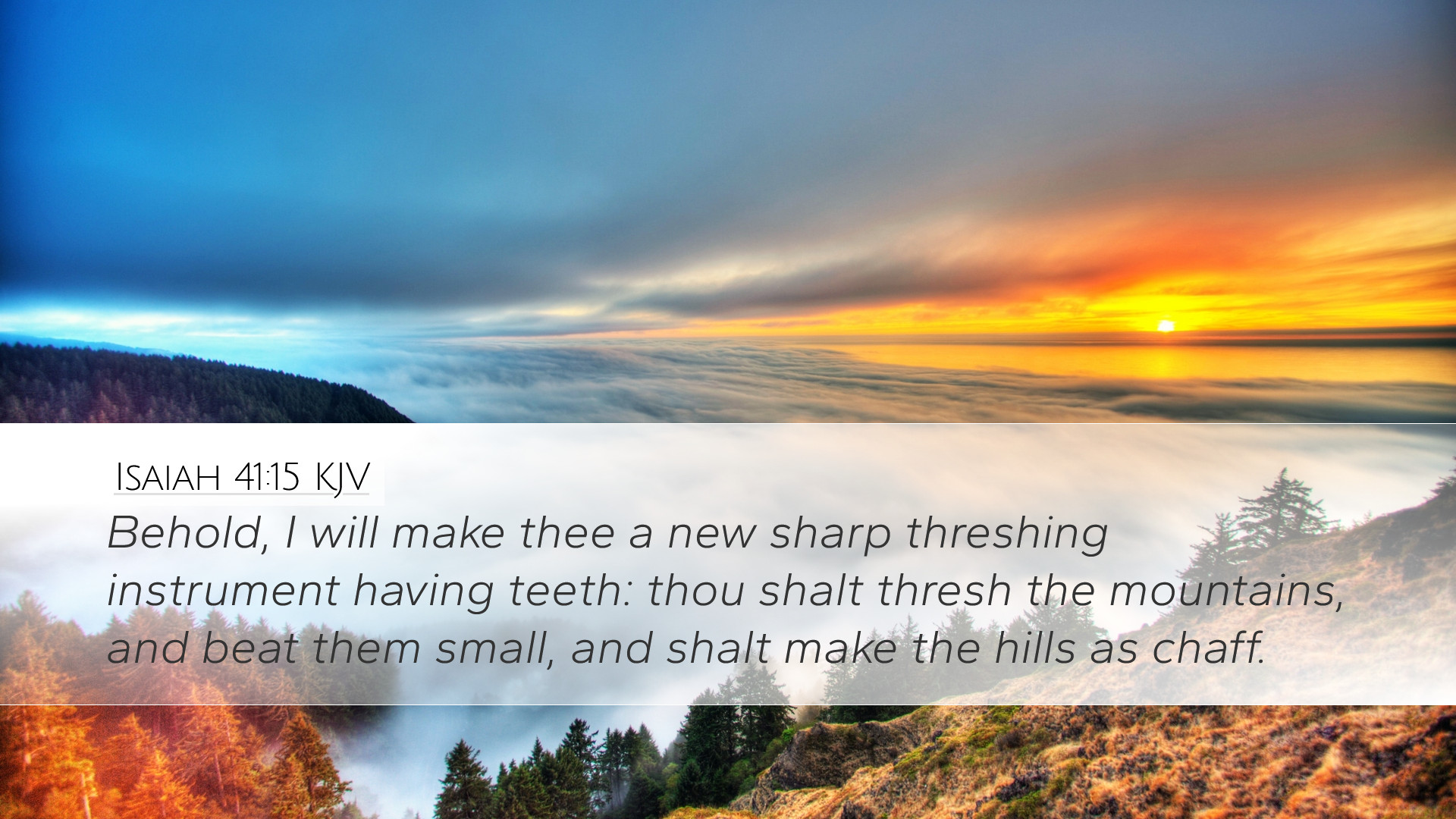Commentary on Isaiah 41:15
Verse: "Behold, I will make you into a new threshing sledge with sharp teeth; you shall thresh the mountains and beat them small, and make the hills like chaff." (Isaiah 41:15, NKJV)
Introduction
Isaiah 41:15 presents a powerful image of transformation and strength. In this verse, the Lord speaks of His people, Israel, promising to empower them for divine purposes. This commentary synthesizes insights from notable public domain resources, namely Matthew Henry, Albert Barnes, and Adam Clarke, to elucidate the significance of this verse for contemporary readers.
Contextual Background
The book of Isaiah was written during a tumultuous time in Israel's history, marked by impending judgment and later, hope for restoration. This chapter emphasizes God's sovereignty and His unique ability to regenerate and equip His people for the challenges they face. The metaphor of a "threshing sledge" signifies not only the means of separation—between the wheat and the chaff—but also the forcefulness with which God's people are to conquer obstacles.
Exegesis and Interpretation
Divine Enablement
Matthew Henry's Insight: Henry elaborates on God’s promise to form Israel into a "new threshing sledge" as a metaphor for divine empowerment. This notion highlights God’s active role in enabling His people to not just endure challenges but to prevail over them. The Lord’s declaration emphasizes His power and the new identity He bestows upon Israel.
Symbolism of the Threshing Sledge
Albert Barnes' Perspective: Barnes points out the significance of the ancient implement of harvesting, the threshing sledge. In agricultural terms, threshing signifies separating the valuable from the worthless. By describing Israel as a "threshing sledge," God indicates that He will enable His people to separate the righteous remnant from the corruption around them, thus fulfilling His redemptive plan.
Conquest over Obstacles
Adam Clarke's Commentary: Clarke emphasizes the metaphor of "threshing the mountains," suggesting that God empowers His people to confront formidable challenges. Mountains symbolize significant obstacles or adversaries in life. This imagery is meant to inspire confidence in God's provision and power, assuring believers that through the empowerment of God, no challenge is insurmountable.
Theological Implications
God’s Transformational Power
The promise made in Isaiah 41:15 illustrates God’s desire to transform His people by His power. This is a key theme in Scripture; the faithful often find themselves on the receiving end of divine enablement to accomplish tasks beyond their natural capabilities.
Encouragement for Believers
This verse serves as an encouragement to pastors, students, theologians, and scholars, reminding them that spiritual leadership often requires confronting great challenges. The assurance of divine assistance can inspire encouragement and boldness in ministry and scholarship.
Applications for Today
Today’s readers of Isaiah 41:15 can find multiple applicable insights:
- Empowerment for Service: Believers are called to recognize their identity in Christ and the empowerment given by the Holy Spirit for ministry.
- Confronting Challenges: Just as God equipped Israel, He equips modern-day believers to face societal challenges and personal struggles with confidence.
- Separation of the Righteous: The concept of threshing serves as a reminder for the Church to discern between good and evil, guiding and empowering them in their spiritual journeys.
Conclusion
Isaiah 41:15 is a profound testament to God's unwavering commitment to His people. The imagery of a "new threshing sledge" not only conveys divine empowerment but also challenges believers to engage in their calling with confidence. Through the synthesis of insights from Matthew Henry, Albert Barnes, and Adam Clarke, modern readers can derive meaningful applications that resonate with the ongoing narrative of God's work among His people. With God's strength, believers are called to confront obstacles and achieve His purposes in a mighty way.


